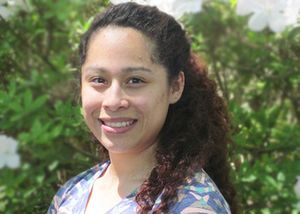
Katherine Quijada of Cooleemee, a graduating senior at Catawba and a Noyce Scholar, says her summer 2014 internship at the UNC Chapel Hill Nutrition Research Institute in Kannapolis made her want "to strive for so much more."
Quijada graduated from Catawba on May 16 with a mathematicsmajor and a secondary education minor, but her education will not end with Catawba.
"I was always kind of unsure as to whether or not I wanted to further my education beyond a bachelor's [degree], but my experience with Dr. [Philip] May [her internship supervisor at NRI] helped open my mind to all that is out there. I definitely want to get my master's."
May, Quijada's internship supervisor, is also a Catawba alumnus, a member of the class of 1969. He is a Research Professor for UNC and works at NRI, continuing his National Institute of Health-funded research on the prevalence in characteristics of Fetal Alcohol Spectrum Disorders in three communities in the U.S. and five communities in South Africa, while also working on a growth and development study in Kannapolis and Cabarrus County.
And just how was Quijada able to assist May with his research? She learned new analytical techniques, used them to analyze her data, and used her bi-lingual skills to help Dr. May and his team conduct maternal risk assessment interviews in Spanish with a number of mothers.
And how will what Quijada learned assist her in her career as a mathematics teacher? "She now has experience in applied statistics that most math teachers don't get trained in or experience," May said. He calls the relationship between Quijada and NRI "reciprocal."
Quijada explains the internship was important to her because "it opens up your mind to all the things you can do. You learn that you can have other options, other doors, that might lead you to get a second degree."
Quijada says she was "nervous and intimidated" about transferring from Davidson County Community College with her associate's degree in science to Catawba. Her admissions counselor at Catawba told her about the Noyce Scholars opportunity which could help underwrite the costs of her education while requiring her to repay those costs by teaching for four years in a high need high school.
She is hopeful that her own life experiences as a bilingual student will assist her when she lands a teaching job this fall. "Being that I speak two languages, I know the issues of not knowing the language as well and getting mixed up and perhaps not understanding fully. I coach at the Davie YMCA and I work with kids from all ages and have always interacted very well with them, so again, I said why not teach."
Quijada, who has a five-year-old son born while she was a senior in high school, has pushed through to earn her education. She believes Catawba was a perfect fit for her. "You get to know your professors on a personal level and the small campus is wonderful."
Catawba College received a $1.45 million grant in October of 2013 from the Robert Noyce Scholarship Program of the National Science Foundation. That grant, the largest that Catawba had ever received, provides five years of support for scholarships and internships that help prepare Science, Technology, Engineering, and Mathematics (STEM) majors for teaching careers.
The Noyce grant will ultimately provide paid internships for up to 60 freshman and sophomore students at RCCC to experience teaching and to recruit them to pursue a career in K-12 education. Eighteen upperclassmen, one of whom is Katherine Quijada, who pursue a major in a STEM discipline and licensure in teaching at Catawba College will receive $18,000 scholarships in their junior and senior years of college.
Following graduation, these Noyce Scholars will be required to work for four years in a high-need school district as a condition of receiving the scholarship. During this time, they will receive funds to attend a state STEM education conference and to purchase classroom supplies.
The NSF grant is directed by Dr. Connie Rogers-Lowery, associate professor and chair of biology at Catawba. Others on the faculty team who collaborated on the grant proposal include from Catawba, Dr. Cyndi Osterhus and Dr. John Zerger, professor of mathematics; and from Rowan-Cabarrus Community College, Dr. Marcy Corjay, dean of science, biotechnology, mathematics, and information technologies.
The grant period began Oct. 1, 2012 and expires Sept. 30, 2017.
Editor's Note: Katherine Quijada has accepted a math position at Davie High School beginning August 2015.
